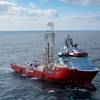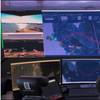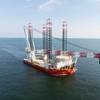USARC Calls for Arctic Oil Spill Research
The U.S. Arctic Research Commission believes that the U.S. needs a robust research program to address spill response in broken ice, as shipping moves into the Arctic Ocean and offshore oil drilling - in several Arctic nations - moves forward.
Mead Treadwell, chair of the U.S. Arctic Research Commission, prepared testimony for the August 20 field hearing in Anchorage of the U.S. Senate's Homeland Security Subcommittee of the Senate Appropriations Committee. Treadwell told the committee that, contrary to laws passed by Congress after the Exxon Valdez oil spill disaster in 1989, a significant national oil spill research program does not exist, nor is one planned to fit the special needs of the Arctic. It was anticipated that the U.S. Coast Guard, chair of an Interagency Oil Pollution Research Coordinating Committee, established in the Oil Pollution Act of 1990, would produce a research plan designed especially for the Arctic. To date, however, no such plan exists. The Commission recommends that research funds be made available from the $2.7b federal Oil Spill Liability Trust Fund (OSLTF), which collects five cents per barrel of oil produced or imported into the United States.
Treadwell discussed the issue Wednesday with White House and Interior Department officials, the Commandant of the Coast Guard and the Administrator of NOAA during a Coast Guard flight over oil and gas exploration sites in the Arctic Ocean, with a stop in Barrow, the northernmost community in the United States. During the visit to Barrow, North Slope Borough Mayor Edward Itta, whose administration has sued to stop oil drilling in the Arctic Ocean, told the visitors from Washington that one reason he has gone to court to fight offshore drilling is that he is not satisfied with the capability to clean up oil spilled in broken ice.
"If the Interagency Oil Pollution Response Coordinating Committee calls a meeting to start this planning process, we will help," Treadwell said. "The USARC will do what it can to have the appropriate agency players, industry players, community leaders, and spill research specialists involved. We will take a proposal for funding to the White House. And we will let the Congress know, as the law requires, whether the process is working or not."
The Arctic Research Commission has co-sponsored two planning workshops of experts in the last five years detailing needs for Arctic oil spill research, and has visited with scientists conducting a "joint industry program," funded by a number of government and industry partners, to test oil in ice response techniques offshore in Norway.
Renewed support for oil spill research is also included in a package of Arctic bills introduced this month by Senator Mark Begich of Alaska.
"A recent test there, costing over $10m, showed promising results for a number of technologies, including burning, skimming, dispersants, coagulants, and bioremediation," Treadwell said. "There is more work to be done."
Norway, Greenland, Canada and Russia all have offshore drilling programs planned or in effect that could benefit from improved spill prevention and response technology.
The United States produces or imports approximately 15 million barrels of oil per day, according to the Energy Information Administration. At $70 per barrel, the nickel per barrel collected for the $2.7b Oil Spill Liability Trust Fund is far less than one percent of the price of oil, yet a $30 to $50m annual commitment for research, put out to competition for University laboratories across the country, could help reduce spill risks, Treadwell said.
In 2008, oil companies bid $2.7b from the Department of the Interior's Minerals Management Service for rights to drill in the Chukchi Sea area northwest of Barrow. Drilling is yet to begin.
The group of senior officials visiting the Arctic, led by Nancy Sutley, chair of the White House Council on Environmental Quality, will hold the first meeting of the Obama Administration's Interagency Ocean Policy Task Force in Anchorage on Friday. USARC Commissioner Vera Metcalf intends to deliver the Commission's message there as well.
Admiral Thad Allen, United States Coast Guard Commandant; Dr. Lawson Brigham, University of Alaska Fairbanks; David Benton, Executive Director, Marine Conservation Alliance, and Mayor Itta are also invited to testify at today's hearing, which is to focus on U.S. Arctic policy.
"Our nation's energy security is at stake, and the Alaska pipeline is running at only one quarter of its capacity. Statistics show that spills are a greater risk from shipping and fishing vessels and those vessels are moving north. Whatever we do as a nation on offshore drilling, the ships and oil and gas exploration activities of other nations may have an effect on our Arctic shores," Treadwell said.
"We have heard from the oil industry that has bought leases offshore Alaska that they, too, while confident they can respond now to an accident, want to see a research program in place. The law calls for it, so let's do it. We have to come together."
In its forthcoming Goals and Objectives for Arctic Research 2009 for the U.S. Arctic Research Program, USARC calls for promoting research efforts in five broad categories: (1) environmental change of the Arctic Ocean and Bering Sea; (2) Arctic human health; (3) civil infrastructure; (4) natural resource assessment and earth science; and (5) indigenous languages, identities, and cultures. The report also advocates greater interagency efforts to coordinate and collaborate on Arctic research programs, greater federal financial support of scientific research conducted by academia and non-profits, and means to capitalize and support the ongoing costs of infrastructure (e.g., icebreakers, laboratories, satellites, observatories, networks, sensors, and autonomous vehicles), necessary to conduct Arctic research.
The Arctic Research and Policy Act of 1984 established USARC. This federal agency's principal duties are to develop and recommend an integrated national Arctic research policy and to assist in establishing a national Arctic research program plan to implement the policy. Commissioners also facilitate cooperation between the federal government, state and local governments, and other nations with respect to Arctic research, both basic and applied. The U.S. conducts approximately $400m in Arctic research annually.

















